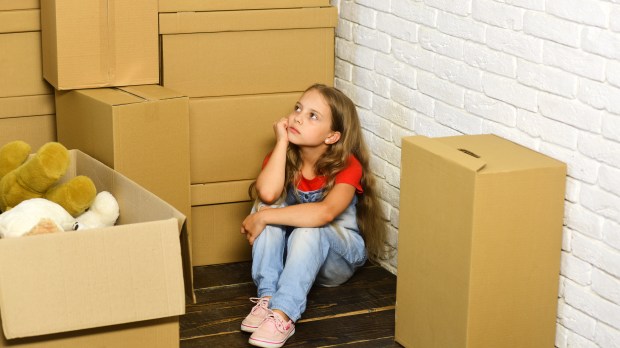Children’s adjustment to a big move requires time and depends on their self-confidence, says psychotherapist Virginie Tesson. She sheds light on how can we help them get through this difficult time.
What happens to a child during a move?
What characterizes a move is the loss of markers, points of reference. Moving weakens the already fragile. Among toddlers, this imbalance can manifest itself as behavioral problems, lack of appetite, or even more often, loss of sleep. The child cannot go to sleep, or cries when going to bed, and wakes up several times during the night, as if they were lost. With older children, the most difficult part is having to separate from a friend.
Children’s reaction to change depends directly on their level of self-confidence and their confidence in life. If their confidence is high, they can get through this loss of markers and friends, stay confident, reach out to others, and let themselves adjust. If their confidence is low, the losses will be painful, and they will have a tendency to withdraw. A child will need time, at least several weeks, to process the change.
Why is this change so upsetting?
Moving can trigger separation anxiety, which sometimes originates in the womb. When the mother feels good and is happy, the child in her uterus feels the mother’s love. When she suffers, for whatever reason, the child feels it as a lack of love. This becomes part of the child’s unconscious memory and can be reactivated during a later separation, like moving.
How do we help alleviate a child’s anxiety?
As with all disorders related to separation anxiety, I advise the mother to tell the child the story of the child’s life. Go over the painful moments, tell the child that at those moments, even if the child didn’t feel it, they were loved. Then raise the grief manifested during the move, and invite the child to choose to believe that, in this situation again, they are still loved by their mom and dad. Insist on this: the love remains forever, even as they see so many changes around them.
How do we inform the child?
Talking to your children as early as possible gives them time to prepare for it. Parents need to tell them what they know, especially how they themselves are experiencing the change. They can explain the reasons for their choice: “We thought we could change cities so that dad could be happy in his work, and because when dad who is happy in his work, this is a good thing for the whole family.” A move that everyone in the family understands is a source of strength and unity.
How do we respect each child’s rhythm and progress?
Everyone must have the opportunity to express themselves on what they feel: “What are your fears, your apprehensions? What makes you happy?” At the top of the list of worries is the loss of friends. It is up to the older children to maintain their old friends if they wish to do so. I don’t like telling them, ‘You’ll find new friends.” Every encounter, every friendship is unique, we can’t replace them. But “you’ll make new friends as well” is fine. Everything that has been experienced before is a source of richness. This precious treasure is not taken away, on the contrary, it stays with us forever, as long as we want it to.
Can moving be an opportunity to grow?
Yes, for some, it can be a path to growth. But be careful: psychologically, this change is similar to mourning. Family members will experience moments of despondency, grief (of not being able to see their loved ones every day), and fear (“will I be able to enjoy myself here, build new friendships?”). Everyone in the family needs to be able to express their feelings, adults and children alike.
What advice would you give to children who are having difficulty adapting to their new environment?
There is no magic formula, as the problem of adaptation is linked to previous difficulties. Above all, don’t try to be positive – “You’ll see, it’s going to be great!” On the contrary, try to really reach out to your child in the painful experience they are going through, help them verbalize their losses. The essential thing is to confront the child with their choice, to invite them to choose life, happiness, and encourage them to dare to reach out to others, to make new encounters. In the early stages, don’t ask them about school work, but about their social interactions: “Have you met any friends? What are their names, what do they do, what games do they play?” Let them reach out to others and experience the joy of being welcomed.
Remarks collected by Raphaëlle Simon


